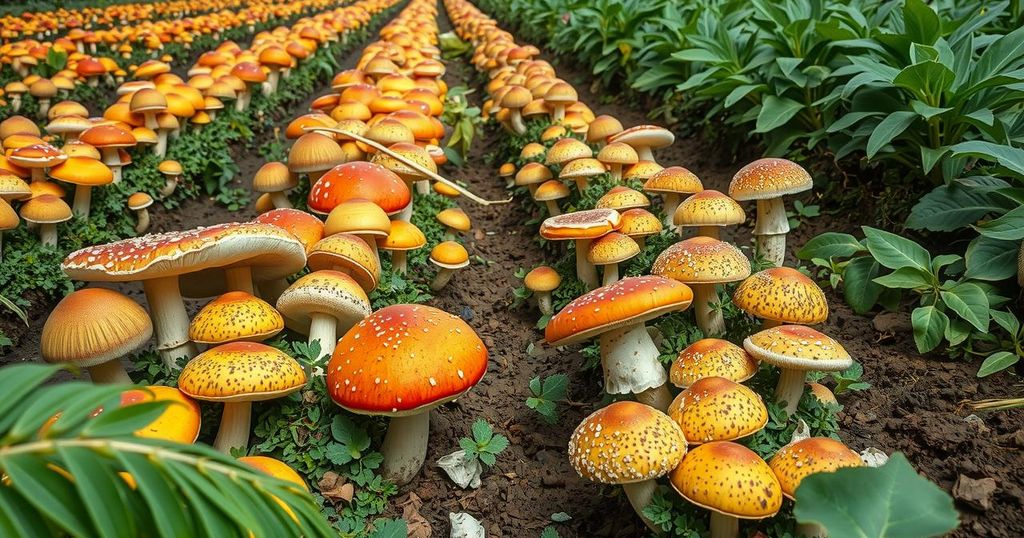Ethiopian Entrepreneur Turns Passion for Mushrooms into Economic Growth
Mikias Tadesse, an Ethiopian entrepreneur, is pioneering mushroom farming to transform local diets and stimulate economic growth in Ethiopia. Despite initial market resistance, his persistence led to increased demand for mushrooms. Supported by Chinese agricultural experts, Tadesse aims to expand his business and deepen his expertise, with hopes of exporting processed mushrooms in the future.
Mikias Tadesse, a burgeoning Ethiopian entrepreneur, is transforming the culinary landscape in Ethiopia, particularly around Addis Ababa. His journey from truck driver to successful mushroom farmer illustrates how one man’s fascination can create new economic opportunities. Tadesse’s interest in mushrooms started a few years back when he encountered a cluster growing at a Chinese road construction site. This unexpected experience sparked a desire to delve deeper into the world of mushrooms.
His first taste of mushrooms was a dish prepared by Chinese chefs, which he found surprisingly delightful. Tadesse recognized the potential mushrooms held for diversifying Ethiopian cuisine and enhancing food security. He subsequently pitched the idea of mushroom farming to his Chinese colleagues. Their enthusiastic encouragement was pivotal. “Their support was immediate… they promised to assist me in this new venture,” he noted, underlining the importance of their backing.
However, gaining public acceptance for mushrooms proved challenging. Tadesse faced significant resistance, as most Ethiopians are unfamiliar with mushrooms as a food source. “I struggled with market resistance. Many people did not consider mushrooms as food,” he explained. To combat this, he actively promoted his produce to restaurants and hotels across the city, despite facing numerous rejections.
Over time, Tadesse’s determination began to bear fruit. Slowly, some supermarkets agreed to carry his mushrooms, but the initial sales were less than promising. In the first six months, he often ended up retrieving unsold products from store shelves. Yet, as consumer demand gradually increased, his efforts were validated; sales began to pick up, leading to growth in his business.
Now, Tadesse manages multiple mushroom cultivation sheds, producing various types, including Yellow mushrooms, King Trumpets, and Oyster mushrooms. “Although our farm yields an average of 50 kilograms of mushrooms and employs twelve workers, we struggle to keep up with demand,” he remarked, reflecting on the success and challenges of his enterprise.
He attributes much of his success to the significant support from Chinese agricultural experts, crucial in terms of knowledge and resources. “Their assistance has been transformative… it forms the foundation of our farm and business,” he said, showing appreciation for their ongoing involvement.
Among these experts is Zheng Aibao, a seasoned mushroom cultivator visiting Ethiopia for the third time. He expressed satisfaction witnessing the adoption of cultivation methods introduced by his compatriots across several farms in the region. For Tadesse, future aspirations are clear; he aims to enhance his expertise in mushroom farming and to begin exporting processed mushrooms. “With collaborative efforts from the government and private sector, I foresee mushrooms becoming a staple in more Ethiopian diets, adding variety to meals,” he concluded, optimistic about what lies ahead.
Mikias Tadesse’s story emphasizes how passion and determination can create unexpected opportunities, profoundly impacting culinary practices and economic landscapes. His journey stands as an inspiring example of how resourcefulness and support from experts can lead to successful entrepreneurship. With mushroom farming gaining traction in Ethiopia, the future looks promising for broader societal dietary changes and economic growth.
Original Source: english.news.cn




Post Comment